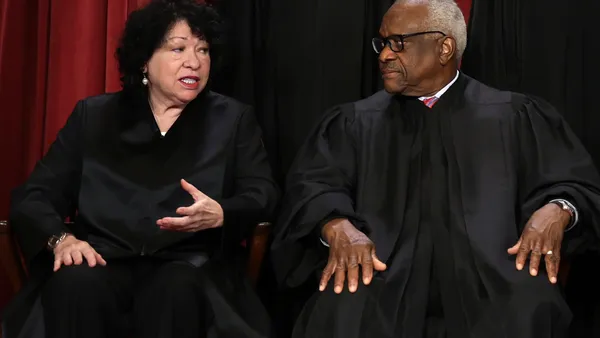Dive Brief:
- American Airlines has asked the Northern District Court of Texas to grant summary judgment on the lawsuit brought forth by one of its pilots, alleging the company breached its fiduciary duties by investing with fund managers who have ESG initiatives.
- The airline, which had its motion to dismiss the case denied Feb. 21, asked the court on Monday to decide the case as a matter of law and rule against the pilot, Bryan Spence, and the class of plaintiffs that include members of American Airlines’ retirement plan and its retirement plan for pilots.
- Judge Reed O’Connor denied the dismissal because, in his view, Spence had articulated a plausible enough claim “on its face” to continue. However, the airline’s Feb. 26 motion requests the court rule solely on the merits of the case, alleging Spence’s claims of breach fail as a matter of law as he has not proven any evidence of breach or loss.
Dive Insight:
Spence’s lawsuit alleged that American Airlines breached its duties as fiduciaries under the Employee Retirement Income Security Act of 1974. Specifically, Spence said the use of fund managers with ESG objectives is a breach of the airline’s duty of loyalty and prudence and its duty to monitor. In its request for summary judgment, the Fort Worth, Texas-based airline laid out its process for picking and monitoring the performance of its 401(k) plans in the motion, and said Spence has failed to provide any evidence backing up his claims.
“[Spence] has simply failed to compile proof to substantiate the allegations the Court found sufficient to survive [American Airlines’] motion to dismiss,” the motion stated. “[American Airlines is] accordingly entitled to summary judgment on all theories actually set forth in the Amended Complaint. And that should be the end of this case.”
With respect to its duty to monitor, American Airlines said its employee benefits committee is responsible for selecting and monitoring the retirement plans’ investment options. The committee meets quarterly to consider market developments, the plans’ investment managers and potential alternatives, among a broader slate, according to the filing. The committee receives both internal and external guidance on reviewing, monitoring and evaluating the plans, including from investment consulting firm Aon Investments, according to the filing.
The filing also said during the time brought into question in Spence’s suit, the committee has made changes to the plans’ investment opportunities when risks or concerns over returns were raised.
Spence’s claim brings issue with the use of investment managers like BlackRock, who may have ESG initiatives or motives, but the airline’s filing said the use of BlackRock was chosen after a competitive review of other options — including Vanguard, State Street and Mellon Capital Management — which found BlackRock’s fees were “generally lower,” offered “more favorable projected securities lending yields” and “had superior long term performance relative to these peers.” Additionally, the airline said it was able to negotiate fee concessions from the asset manager.
The lawsuit was first filed in August, and American Airlines alleged Spence’s primary goal was to “insert himself into the ongoing, politicized debate over the wisdom of ESG-themed investing,” in its denied motion to dismiss the case.
The case was allowed to proceed when O’Connor ruled Spence had articulated a plausible theory of how the airline “breached their duty of loyalty by allowing their corporate goals to influence their fiduciary goal.”
Spence specifically raised an issue with the airline not stepping in to pressure BlackRock to vote against candidates for ExxonMobil’s board nominated by activist investors Engine No. 1 in May 2021. However, Spence’s expert acknowledges the airline would have had to pressure BlackRock to change its votes across its entire portfolio for that to have made a difference. Additionally, American Airlines said it is common practice to defer proxy voting decisions entirely to fund managers.
American Airlines’ motion said that Spence has proved no evidence that the airline has breached its fiduciary obligations under ERISA, nor has he provided any evidence of loss during discovery. As such, the airline believes it has satisfied the requirements to receive a summary judgment and eschew any further fact finding via a jury or judge trial.














